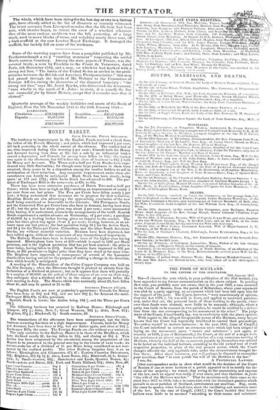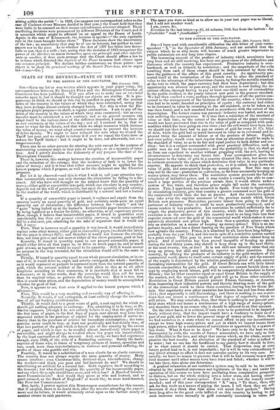THE POOR OF SCCTLAND.
TO THE EDITOR OF THE SPECTATOR.
24th Jauuary 1843.
Sia—I observe the note which, in your publication of the 21st instant, you have appended to my former communication on the above subject. In penning that note, you probably were not aware, that in the year 1823, a case occurred in the Court of' Session, from the parish of Kilbarchan, where your argument was pled by a party opposing an assessment which bad been laid upon him for the support of the poor. The Court, however, "were unanimously of opinion, that the Act 1579, c. 74, was still in force, and applied to landward parishes; and, under that act, the personal funds of these residing in the parish, wher- ever these funds were situated, were liable to be assessed ; although, where a party was liable to be assessed in two parishes, he would be entitled to a deduc- tion from the one corresponding to his assessment in the other." The judg- ment of the Court, I need hardly say, was in conformity with the above opinion. With regard to the alleged irresponsible power of the Heritors, every lawyer knows that the Court has repeatedly interfered to control their proceedings. To confioe myself to modern instances : in the year 1816, (case of Cargill,) the Court interfered to correct an erroneous mode which had been adopted of laying on the assessment upon " means and substance "; and again, SC recently as 1838, (case of Kiltnarnock,) the Court, at the suit of a single heri- tor, overturued an almost unanimous resolution of a very numerous meeting of Heritora, whereby the half of the assessment payable by themselves was ordered to be levied on the indivival heritors, according to the old valued rent of their respective properties, in place of the real present rental, which the Court thought afforded the only equitable rule, under the circumstances brought be- fore them. After these instances, you will perhaps be disfosed to reconsider your assertion, that "in each parish the will of the Heritors is the law."
[Our correspondent seeks to show what would be the decision of the Court of Session if one or more heritors of a parish appealed to it to rectify the de- cision of the majority: we stated, that owing to the uncertainty and expense of the law, such an appeal was rarely if ever made, and that therefore de facto "the will of the Heritore was law." That he meutions only three cases as de- cided front 1817 to 1838, taken in connexion with the discrepant practice which prevails in most parishes of Scotland, corroborates our assertion. Nay, more, the cases he quotes, when looked into, show the vacillating and uncertain state of the law. In the case of Cargill, (1817,) the Court decided that house- holders were liable to be assessed "according to their means and substance
arising within the parish " : in 1823, (we suppose our correspondent refers to the ease of Cochran versus Manson decided in that year,) the Court held that they were liable to be assessed on their means and substance wherever situated. These conflicting decisions were pronounced by different Divisions of the Court, and it is uncertain which might be affirmed on an appeal to the House of Lords. Again, in the ease of Kilmarnock, the decision is special—" the only equitable rule in the cases brought before them." These decisions show the uncertainty of the law; an uncertainty that may be of use to lawyers, but neither to rate- payers nor to the poor. As to whether the Act of 1597 has fallen into desue- tude or not, that is a trifle ; but, seeing that the decision of 1823 recognizes the power of the Heritors to assess themselves upon one principle and other inhabit- ants on another, it does seem strange that the Court should affirm a law to be in force which directed the Justices of the Peace to assess both classes upon one common principle. We decline further controversy on these points : our object is to show the practical working of the Scotch Poor-law, not to argue law-cases.—En.]



























 Previous page
Previous page